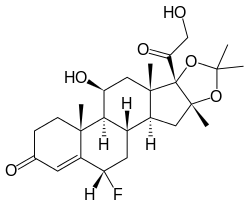Fludroxycortide
 | |
| Clinical data | |
|---|---|
| Trade names | Cordran, Haelan |
| AHFS/Drugs.com | Micromedex Detailed Consumer Information |
| Routes of administration | Topical |
| ATC code | |
| Legal status | |
| Legal status |
|
| Identifiers | |
| |
| Synonyms | 6α-Fluoro-16α-hydroxyhydrocortisone 16,17-acetonide; 6α-Fluoro-11β,16α,17α,21-tetrahydroxypregn-4-ene-3,20-dione 16,17-acetonide |
| CAS Number | |
| PubChem CID | |
| IUPHAR/BPS | |
| DrugBank | |
| ChemSpider | |
| UNII | |
| KEGG | |
| ChEMBL | |
| ECHA InfoCard | 100.014.724 |
| Chemical and physical data | |
| Formula | C24H33FO6 |
| Molar mass | 436.514 g/mol |
| 3D model (JSmol) | |
| |
| |
| | |
Fludroxycortide (INN, BAN, JAN), also known as flurandrenolide (USAN) and flurandrenolone,[1] is a synthetic topical corticosteroid and is used as an anti-inflammatory treatment for use on skin irritations. Trade names include Haelan (Typharm, UK) and Cordran (by Watson Pharmaceuticals, US).[2][3]
Fludroxycortide is available in ointment, cream and as an impregnated tape (Haelan tape, Cordran tape). Licensed indications in the United Kingdom include recalcitrant dermatoses.[4][5]
References
- ↑ CID 15209 from PubChem
- ↑ Drugs.com: Fludroxycortide
- ↑ Patient.info: Fludroxycortide
- ↑ Haelan Tape Summary of Product Characteristics
- ↑ Nakamura, H.; Motoyoshi, S.; Ishii, K.; Seto, Y.; Shimizu, M. (1980). "Anti-inflammatory activity of a topical glucocorticoid, fludroxycortide tape in experimental animals (author's transl)". Nihon yakurigaku zasshi. Folia pharmacologica Japonica. 76 (7): 595–607. PMID 7215997.
This article is issued from
Wikipedia.
The text is licensed under Creative Commons - Attribution - Sharealike.
Additional terms may apply for the media files.